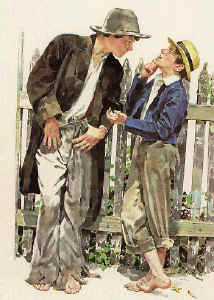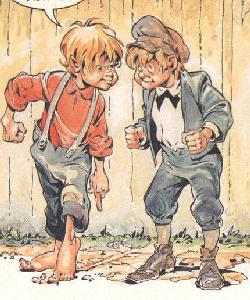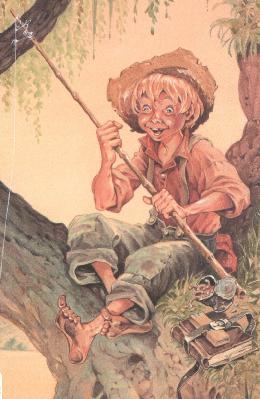Tom Sawyer and Huck Finn
 Huckleberry came and
went, at his own free will. He slept on doorsteps in fine weather and in empty hogsheads
in wet; he did not have to go to school or to church, or call any being master or obey
anybody; he could go fishing or swimming when and where he chose, and stay as long as it
suited him; nobody forbade him to fight; he could sit up as late as he pleased; he
was always the first boy that went barefoot in the spring and the last to resume leather
in the fall; he never had to wash, nor put on clean clothes; he could swear wonderfully.
In a word, everything that goes to make life precious that boy had. So thought every
harassed, hampered, respectable boy in St. Petersburg.
Huckleberry came and
went, at his own free will. He slept on doorsteps in fine weather and in empty hogsheads
in wet; he did not have to go to school or to church, or call any being master or obey
anybody; he could go fishing or swimming when and where he chose, and stay as long as it
suited him; nobody forbade him to fight; he could sit up as late as he pleased; he
was always the first boy that went barefoot in the spring and the last to resume leather
in the fall; he never had to wash, nor put on clean clothes; he could swear wonderfully.
In a word, everything that goes to make life precious that boy had. So thought every
harassed, hampered, respectable boy in St. Petersburg.
The boy ran around and stopped within a foot or two of the flower, and then shaded his
eyes with his hand and began to look down street as if he had discovered something of
interest going on in that direction. Presently he picked up a straw and began trying to
balance it on his nose, with his head tilted far back; and as he moved from side to side,
in his efforts, he edged nearer and nearer toward the pansy; finally his bare foot
rested upon it, his pliant toes closed upon it, and he hopped away with the treasure and
disappeared round the corner. But only for a minute -- only while he could button the
flower inside his jacket, next his heart -- or next his stomach, possibly, for he was not
much posted in anatomy, and not hypercritical, anyway.
 A stranger was before him -- a boy a shade larger than himself. A new-comer of
any age or either sex was an impressive curiosity in the poor little shabby village of St.
Petersburg. This boy was well dressed, too -- well dressed on a week-day. This was simply
astounding. His cap was a dainty thing, his close- buttoned blue cloth roundabout was new
and natty, and so were his pantaloons. He had shoes on -- and it was only Friday.
He even wore a necktie, a bright bit of ribbon. He had a citified air about him that ate
into Tom's vitals.
A stranger was before him -- a boy a shade larger than himself. A new-comer of
any age or either sex was an impressive curiosity in the poor little shabby village of St.
Petersburg. This boy was well dressed, too -- well dressed on a week-day. This was simply
astounding. His cap was a dainty thing, his close- buttoned blue cloth roundabout was new
and natty, and so were his pantaloons. He had shoes on -- and it was only Friday.
He even wore a necktie, a bright bit of ribbon. He had a citified air about him that ate
into Tom's vitals.
"What do I care for your big brother? I've got a brother that's bigger than he is
-- and what's more, he can throw him over that fence, too." [Both brothers were
imaginary.]
"That's a lie."
"YOUR saying so don't make it so."
Tom drew a line in the dust with his big toe, and said:
"I dare you to step over that, and I'll lick you till you can't stand up. Anybody
that'll take a dare will steal sheep."
The new boy stepped over promptly, and said:
"Now you said you'd do it, now let's see you do it."
"Don't you crowd me now; you better look out."
He was fully as uncomfortable as he looked; for there was a restraint about whole
clothes and cleanliness that galled him. He hoped that Mary would forget his shoes,
but the hope was blighted; she coated them thoroughly with tallow, as was the custom, and
brought them out. He lost his temper and said he was always being made to do everything he
didn't want to do. But Mary said, persuasively: "Please, Tom -- that's a good
boy." So he got into the shoes snarling. Mary was soon ready, and the three children
set out for Sunday-school.
No, he would stick to their wake and follow them; he would trust to the darkness for
security from discovery. So communing with himself, Huck stepped out and glided
along behind the men, cat-like, with bare feet, allowing them to keep just far enough
ahead not to be invisible.
 The frost was working out of the ground, and out of the air,
too, and it was getting closer and closer onto barefoot time every day; and next it would
be marble time, and next mumbletypeg, and next tops and hoops, and next kites, and then
right away it would be summer and go-ing in a-swimming. It just makes a boy homesick to
look ahead like that and see how far off summer is. Yes, and it sets him to sighing and
saddening around, and there's something the matter with him, he don't know what. But
anyway, he gets out by himself and mopes and thinks; and mostly he hunts for a lone-some
place high up on the hill in the edge of the woods, and sets there and looks away off on
the big Mississippi down there a-reaching miles and miles around the points where the
timber looks smoky and dim it's so far off and still, and everything's so solemn it
seems like everybody you've loved is dead and gone, and you 'most wish you was dead and
gone too, and done with it all. Don't you know what that is? It's spring fever. That is
what the name of it is. And when you've got it, you want -- oh, you don't quite know what
it is you DO want, but it just fairly makes your heart ache, you want it so! It seems to
you that mainly what you want is to get away; get away from the same old tedious things
you're so used to seeing and so tired of, and set something new. That is the idea; you
want to go and be a wanderer; you want to go wandering far away to strange countries where
everything is mysterious and wonderful and romantic. And if you can't do that, you'll put
up with considerable less; you'll go any- where you CAN go, just so as to get away, and be
thank- ful of the chance, too.
The frost was working out of the ground, and out of the air,
too, and it was getting closer and closer onto barefoot time every day; and next it would
be marble time, and next mumbletypeg, and next tops and hoops, and next kites, and then
right away it would be summer and go-ing in a-swimming. It just makes a boy homesick to
look ahead like that and see how far off summer is. Yes, and it sets him to sighing and
saddening around, and there's something the matter with him, he don't know what. But
anyway, he gets out by himself and mopes and thinks; and mostly he hunts for a lone-some
place high up on the hill in the edge of the woods, and sets there and looks away off on
the big Mississippi down there a-reaching miles and miles around the points where the
timber looks smoky and dim it's so far off and still, and everything's so solemn it
seems like everybody you've loved is dead and gone, and you 'most wish you was dead and
gone too, and done with it all. Don't you know what that is? It's spring fever. That is
what the name of it is. And when you've got it, you want -- oh, you don't quite know what
it is you DO want, but it just fairly makes your heart ache, you want it so! It seems to
you that mainly what you want is to get away; get away from the same old tedious things
you're so used to seeing and so tired of, and set something new. That is the idea; you
want to go and be a wanderer; you want to go wandering far away to strange countries where
everything is mysterious and wonderful and romantic. And if you can't do that, you'll put
up with considerable less; you'll go any- where you CAN go, just so as to get away, and be
thank- ful of the chance, too.
 Huckleberry came and
went, at his own free will. He slept on doorsteps in fine weather and in empty hogsheads
in wet; he did not have to go to school or to church, or call any being master or obey
anybody; he could go fishing or swimming when and where he chose, and stay as long as it
suited him; nobody forbade him to fight; he could sit up as late as he pleased; he
was always the first boy that went barefoot in the spring and the last to resume leather
in the fall; he never had to wash, nor put on clean clothes; he could swear wonderfully.
In a word, everything that goes to make life precious that boy had. So thought every
harassed, hampered, respectable boy in St. Petersburg.
Huckleberry came and
went, at his own free will. He slept on doorsteps in fine weather and in empty hogsheads
in wet; he did not have to go to school or to church, or call any being master or obey
anybody; he could go fishing or swimming when and where he chose, and stay as long as it
suited him; nobody forbade him to fight; he could sit up as late as he pleased; he
was always the first boy that went barefoot in the spring and the last to resume leather
in the fall; he never had to wash, nor put on clean clothes; he could swear wonderfully.
In a word, everything that goes to make life precious that boy had. So thought every
harassed, hampered, respectable boy in St. Petersburg.  A stranger was before him -- a boy a shade larger than himself. A new-comer of
any age or either sex was an impressive curiosity in the poor little shabby village of St.
Petersburg. This boy was well dressed, too -- well dressed on a week-day. This was simply
astounding. His cap was a dainty thing, his close- buttoned blue cloth roundabout was new
and natty, and so were his pantaloons. He had shoes on -- and it was only Friday.
He even wore a necktie, a bright bit of ribbon. He had a citified air about him that ate
into Tom's vitals.
A stranger was before him -- a boy a shade larger than himself. A new-comer of
any age or either sex was an impressive curiosity in the poor little shabby village of St.
Petersburg. This boy was well dressed, too -- well dressed on a week-day. This was simply
astounding. His cap was a dainty thing, his close- buttoned blue cloth roundabout was new
and natty, and so were his pantaloons. He had shoes on -- and it was only Friday.
He even wore a necktie, a bright bit of ribbon. He had a citified air about him that ate
into Tom's vitals.